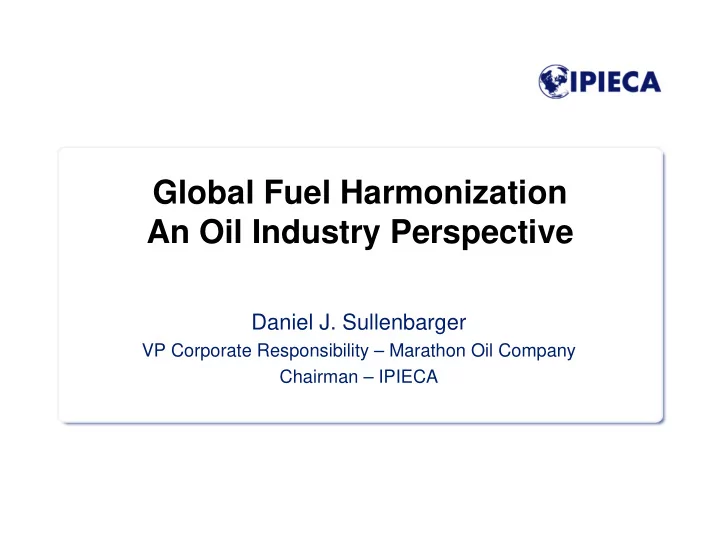

Global Fuel Harmonization An Oil Industry Perspective Daniel J. Sullenbarger VP Corporate Responsibility – Marathon Oil Company Chairman – IPIECA
Introduction to IPIECA Founded 1974 • Provides principal channel of communication with the UN • Single global association representing upstream and • downstream Working Groups • – Oil Spill Preparedness and Response – Global Climate Change – Biodiversity – Social Responsibility – Operations, Fuels, and Product Issues – Health – Sustainability Reporting Help identify new global issues and their potential impact •
IPIECA’s purpose • Main Purposes – Raise awareness and share good practice – Encourage networking and partnerships – Provide access to the latest thinking on key issues – Provide direct interface with United Nations Agencies – Organise workshops and produce publications and guidance – Communicate oil and gas industry action • Does not set nor enforce standards • Helps establish ‘good practice’ • Facilitates engagement between stakeholders
Global Harmonization • Is it feasible? • Costs and realities – The example of MARPOL Annex VI • Developing country priorities – Health – Clean water – Housing & sanitation – etc! • Even the US has multiple fuel standards!
IPIECAs view on harmonization • In the area of fuel quality and emissions – particularly in developing countries - we believe: – Air quality (rather than emissions per se) must always be considered as the prime objective – Investment in fuel quality to improve air quality must be proportionate to overall health expenditure and give ‘bang for the buck’ – Global fuel harmonization will not prove cost effective for developing countries in the short term • As a stepping stone, and matched to vehicle fleet sophistication, phased regional harmonization of key properties affecting air quality may be cost effective
Refining in the real world • Developing country refining differs from the US and Europe – JVs, partly or wholly state-owned refiners are common – Technical support (“housekeeping”) often provided by a major oil company – Upgrade investment is constrained by government priorities – Convincing governments of the value will be a challenge – Regional harmonization could help make the case
Why Regional Harmonization? • Regional harmonization helps to strengthen efforts to prevent: – Fuel adulteration – Smuggling – Misfuelling • It facilitates regional trade • It encourages market transparency and leads to less market distortion • IPIECA actively promotes this approach in Africa
Roadmaps • Roadmaps to regional alignment are key – IPIECA and the ARA promulgated the AFRI standards: we see an overriding ‘framework’ by the AU as essential – ‘Owned’ by the countries, refiners and importers – Should be championed and integrated into a regional policy framework e.g. the EU, African Union, ASEAN, etc. – Political as well as a technical process – Partnerships are key – Timescales MUST be sanctioned by governments
Partners in Lead Phase-Out Initiative IPIECA World Bank / UNEP Technical Input • Regional - Operational Conferences Impacts • Ministerial - Supply Impacts Involvement - Costs • Policy Guidance Auto Industry SSA Governments Technical Input Decision Makers - Existing Fleet - Change Fuel Specs Impacts - Implement Rules - Path to Catalyst - Enforcement Vehicles 9
IPIECA is willing to engage • IPIECA is willing to be a part of the debate – Modification of the existing agreements may not be the best way • May be difficult and time-consuming to get ratification • Not all countries are signatories to the agreements • A partnership process has worked in the past – UNEP PCFV: 4 years to phase out Leaded Gasoline in Sub-Saharan Africa – Now a global process – Can we do the same at WP 29?
A final suggestion • Take small steps in the journey • There is much low–hanging fruit – We talk about global harmonization – Over 100 years after the invention of the first light bulb the world is still unable to agree on a uniform domestic electric power plug, voltage, or frequency – Can we at least set an example and standardize our nomenclature for reporting Octane? • Thank you for your attention
Recommend
More recommend